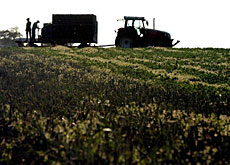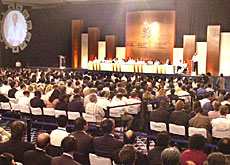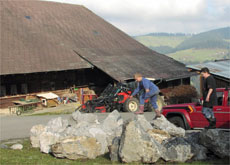Higher costs drive farmers out of business

Falling revenues and higher costs are continuing to force many farms to close, according to a report released by the Federal Agriculture Office.
Small farms were worst affected by the sector’s lacklustre performance, with 2.2 per cent closing between 2000 and 2002.
Officials said on Monday that average yearly income rose 4.7 per cent on 2001, but was still one per cent down on the average for the past three years.
“Agricultural costs rose steadily, which contributed substantially to keeping revenues at a low level,” the report said.
It warned that lower milk prices and this year’s hot and dry summer meant 2003 was likely to be another lean year. Preliminary estimates suggest incomes could fall by up to 13 per cent.
And farmers cannot look forward with much optimism towards an increase in the near future.
“According to forecasts for 2003, income should drop in comparison with 2002 figures. There’s no improvement in sight,” confirmed the department’s director, Manfred Bötsch.
The Agriculture Office also expressed concern over the widening salary gap among farmers. Annual incomes ranged between SFr48,000 ($36,000) and SFr111,000.
Small farms fold
Between 2000 and 2002, Switzerland saw 3,116 farms close, leaving 67,421 farms in business. The report showed that small farms were most affected by troubles in the sector.
More than five per cent of farms between three and ten hectares in size closed. Some 215 farms of less than three hectares also closed.
The disappearance of small farms was central to the improved productivity of bigger farms, said the Agriculture Office.
Indeed, the number of farms between 20 and 50 hectares rose 1.4 per cent, while those above 50 hectares increased by 6.8 per cent.
Overall, farms are managing marginally better to stay in business than a decade ago. Between 1990 and 2000, 22,278 farms were abandoned at an annual rate of 2.7 per cent.
But it’s not all bad news. The government said that farmers managed to increase their output of organic goods over the past year.
Land set aside for organic farming grew eight per cent between 2001 and 2002, to account for 9.6 per cent of all exploited land.
Pressure to reform
Swiss farmers are under government pressure to become more competitive in the face of steps being taken at the international level towards market liberalisation.
Economics Minister Joseph Deiss said in August that Switzerland was committed to liberalising its agriculture sector under a government timetable set for 2004-2007.
And he warned Swiss farmers, who are fiercely protective of government subsidies, against obstructing the path to reform and jeopardising the country’s participation in any global trade pact.
swissinfo, Samantha Tonkin
Farmers’ salaries dropped by one per cent in 2002 compared with the average over the previous three years.
Incomes between farmers widened with salaries spread between SFr48,000 and SFr110,000.
Some 2.2 per cent of farms folded between 2000 and 2002.
The number of organic farms grew eight per cent between 2001 and 2002, to account for 9.6 per cent of all exploited land.

In compliance with the JTI standards
More: SWI swissinfo.ch certified by the Journalism Trust Initiative



You can find an overview of ongoing debates with our journalists here . Please join us!
If you want to start a conversation about a topic raised in this article or want to report factual errors, email us at english@swissinfo.ch.